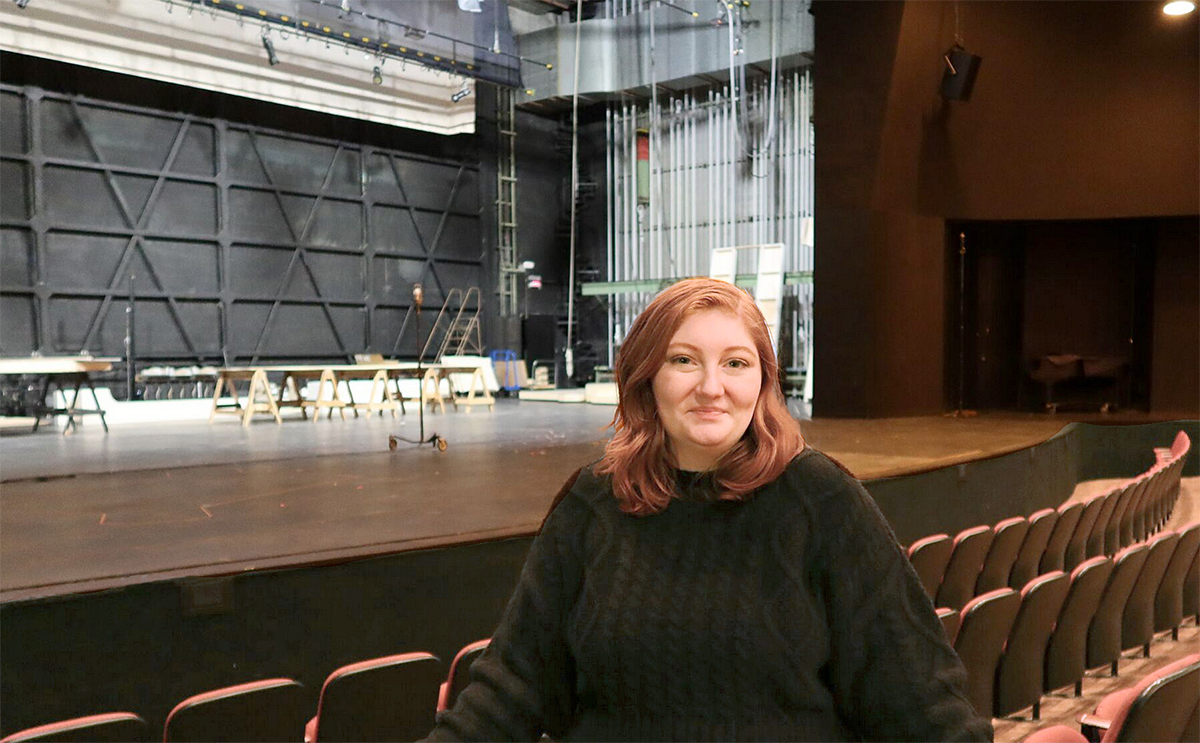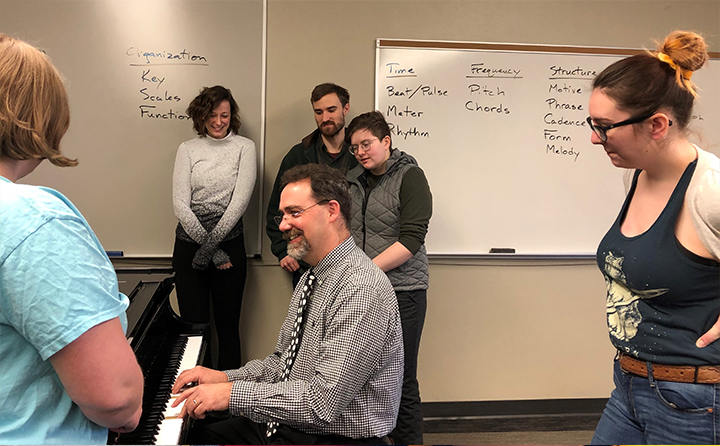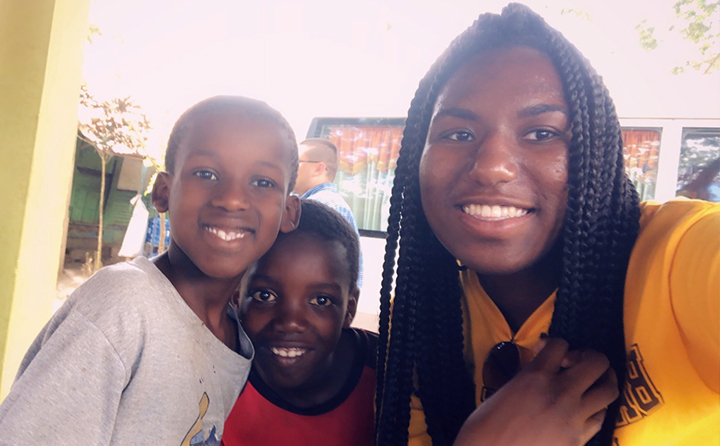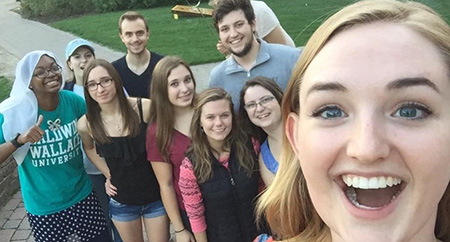Honors Program
Overview
The honors program at Baldwin Wallace helps motivated and engaged students reach their full potential and make the most of their college experience. As an immersive academic experience with a foundation in mentorship and community, the honors program emphasizes critical thinking, problem solving, leadership, and collaborative learning. Students who complete the honors program acquire an array of experiences and skills that appeal to employers, prepare them for continued education, and enhance their capacities to tackle complex issues.
The Liberal Arts — Redefined
Interdisciplinary and experiential, the honors program offers unique courses that blend the theoretical and the practical and often align with curricular requirements of the BW Advantage (BW’s Core Curriculum) or their majors. Encouraging academic exploration and independent thinking, the honors program can augment any program of study and expand the opportunities available to students.
Your Success — At the Heart of Everything We Do
Through honors classes, leadership opportunities and co-curricular programming, participation in honors helps students develop the skills they need and the knowledge of how to use them. The Honors Colloquia Series promotes social engagement among current honors students and brings alumni and other speakers from around the country into virtual and in-person conversations with our students throughout the academic year to share their career paths, life experiences, and expert advice. Mentoring from peer leaders and honors advisors provides ongoing support for students to ensure that they get connected on campus and take advantage of everything BW has to offer.
Curriculum
The honors program prepares students with the skills needed to address the complex problems facing our communities and our world. Honors curriculum is designed to help students develop transferable skills in independent thinking and research. These outcomes encourage students to understand multiple perspectives, apply appropriate theories and methods to address important questions, and develop their own well-informed voices.
Additionally, students will select one of three focused areas of skill development to enhance their versatility and career readiness (these three areas are: study of a non-English language and culture outside of the US; data programming; or statistics). Representing the humanities, STEM, and social sciences, these skills are prioritized to ensure that all honors graduates leave BW ready to continue their education at the most distinguished institutions, thrive in career pursuits and participate in engaged citizenship in a global society.
Interdisciplinary and Experiential
The honors program offers an evolving collection of courses each year that help students engage across subject areas and merge the theoretical and the practical. Often involving hands-on work in the classroom, community or laboratory, honors classes provide a setting for experimentation, collaboration and rich engagement with the liberal arts. Honors courses count as honors electives in our requirements and most fulfill general education requirements of the University.
Not More Difficult, but More Deeply Engaged
Intended to be exciting, distinctive and skill-building, honors courses do not require more work than non-honors classes and should not be thought of as "harder" than non-honors classes. Honors faculty are encouraged to be innovative and take a deeper dive into a subject than a typical introductory course can provide, thus offering special opportunities for enriching your education regardless of your area of study.
Admission to Honors
The BW honors program seeks motivated and engaged students who demonstrate the potential to excel academically and as leaders on campus. We value a diversity of experiences, backgrounds and identities, and look for students who will contribute to our vibrant community of scholars.
Admission from High School
Students admitted to BW with a 3.75 weighted GPA will be automatically invited to apply to the honors program at the time of their acceptance. Students who are not automatically invited to apply, but who believe they have strong potential for success and achievement in college, should discuss their interests in applying to honors with their admission counselor or contact the honors program staff directly at honors@bw.edu.
Admission of Current BW Students
Students who do not join at the start of their first year at BW have an opportunity to do so in their second semester. The honors program solicits nominations from faculty and encourages students to self-nominate for consideration. Students with a nomination and a 3.5 GPA after the first semester will be invited to speak with honors leadership to learn more about the honors program and, if interested, can apply during the spring semester.
Transfer Students
The BW honors program welcomes interested transfer students to contact us directly at honors@bw.edu to discuss whether honors could be a good fit for you. Transfer students must have above a 3.4 college GPA to apply. Please note that the honors program has been designed as a 4-year experience, so applications from transfer students will also be assessed in terms of factors beyond academic performance, to include the number of credits at entry, major requirements, and the feasibility of completing all honors requirements within the individual student’s expected timeline for degree completion.
Student Experiences
Student-Directed Research
As one of three pillars of the honors program, our focus on student-directed research is about empowering students to learn to ask their own questions and develop the understanding of theory, methods, and other tools needed to pursue sophisticated answers. With numerous options available, honors students pursue research in every discipline with the guidance of a faculty mentor.
Honors Thesis/Senior Project
Every honors program student will complete their college experience with a thesis or senior project tailored to their individual needs and interests. While many projects take the form of a traditional thesis focused either on laboratory or text-based research, other students choose creative or technical projects.
Gracie Albus '24, Theatre: Stage Management: "Playhouse Square is Alive and Well: A Closer Look into the Show that Saved Cleveland’s Theatre District"
Charlize Bernhardt ‘24, Digital Media and Graphic Design: "The Making of Shrooman and the Benefits of Visual Art on Children’s Learning"
Juliet Penrod '24, Business Analytics: "E-Commerce Trends in Spanish-Speaking Markets"
Lauren Reid '25, Psychology: "Social Emotional Intelligence Predicts Authentic Leadership"
Andrew Walker '24, History: "Examining Perspectives: Functionalism and Intentionalism in Nazi Germany"
Honors Welcome
The first-year student honors welcome program offers an empowering beginning to your honors experience. Before the academic year commences, the honors program hosts an overnight orientation for incoming first-year students. Designed to initiate new students into the honors community, the welcome program packs in exciting team-building activities, as well as specialized class sessions and workshops on the transition to college.
Begin Building Friendships Immediately
The Welcome provides an opportunity for new students to start developing friendships that will last for a lifetime. Sharing this experience means that honors students have something in common right away and can build on that foundation as their relationships develop in the coming months and years at BW.
Mentoring and the Honors Community
First-year students are not the only students we involve in the Honors Welcome — we also include a group of upper-class honors peer leaders who act as mentors, friends and advisors through the experience. These peer leaders will work with the incoming cohort throughout the Honors Welcome and beyond, helping new students adjust to life at BW and get engaged with campus resources and opportunities.
Mentoring is also a central aspect of the relationship that honors students have with their honors advisor. Honors advisors are the instructors for honors first-year seminar courses, ensuring that a strong relationship is established from the very start of a student’s time at BW. Those relationships continue for the full four years, evolving from a focus on engagement and developing connections to one of future planning and resume development.
Honors Living and Learning Community
Honors offers a vibrant residential experience for first-year and upper-level students in one of the most desirable residence halls on campus, Carmel Living and Learning Center. Centrally-located and adjacent to the student union and largest dining hall, Carmel features suite-style double rooms with two rooms connected by a shared bathroom. The facility is air-conditioned, carpeted and equipped with a kitchen and multiple student lounges. The hall includes eight large common rooms with a variety of amenities.
Feels Like Home!
Being a part of a supportive, close-knit environment with other dedicated honors students helps you form friendships that last all four years and beyond.
Academically Supportive Environment
Join a community of ambitious, intelligent and passionate students. You will be able to live and work in a welcoming environment where other students respect your goals and share your commitment to excellence.
Learning Outside the Classroom
Living together will encourage you to attend campus events and join student organizations with your honors peers. You will enjoy the stimulating intellectual and social atmosphere of living with other engaged students and together take advantage of programming sponsored by the honors program, honors leadership board and residence life.
FACULTY & STAFF
Brian Monahan, Ph.D.
Director, Honors Program
Professor, Department of Sociology
Criminal Justice Program
(440) 826-2146, bmonahan@bw.edu
Angela L. Planisek, Ph.D.
Associate Director, Honors Program
Associate Professor, Carmel Boyer School of Business
(440) 826-2083, aplanise@bw.edu
Frequently Asked Questions
- What are the benefits of the honors program?
- Will the honors program help me be more successful after college?
- What is the rigor compared to a regular course schedule?
- How will honors courses fit in with my schedule and major?
- Can I complete the honors program if I am in the Conservatory of Performing Arts?
- What is an honors senior thesis?
- Is there a student organization for honors students?
- Are there scholarships specifically for honors students?
- Does the honors program accept students with learning disabilities?
- If I have more questions, whom should I contact?






